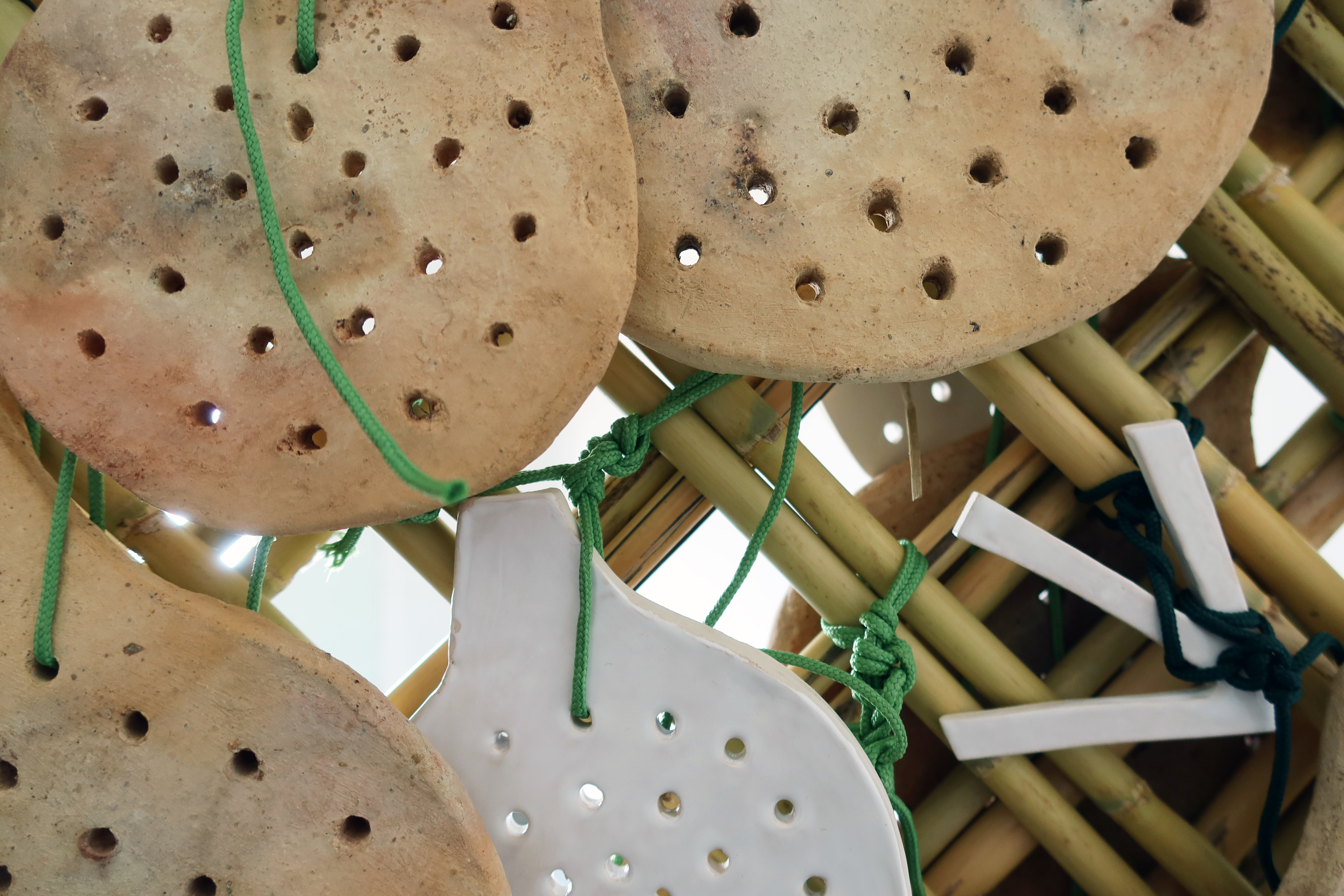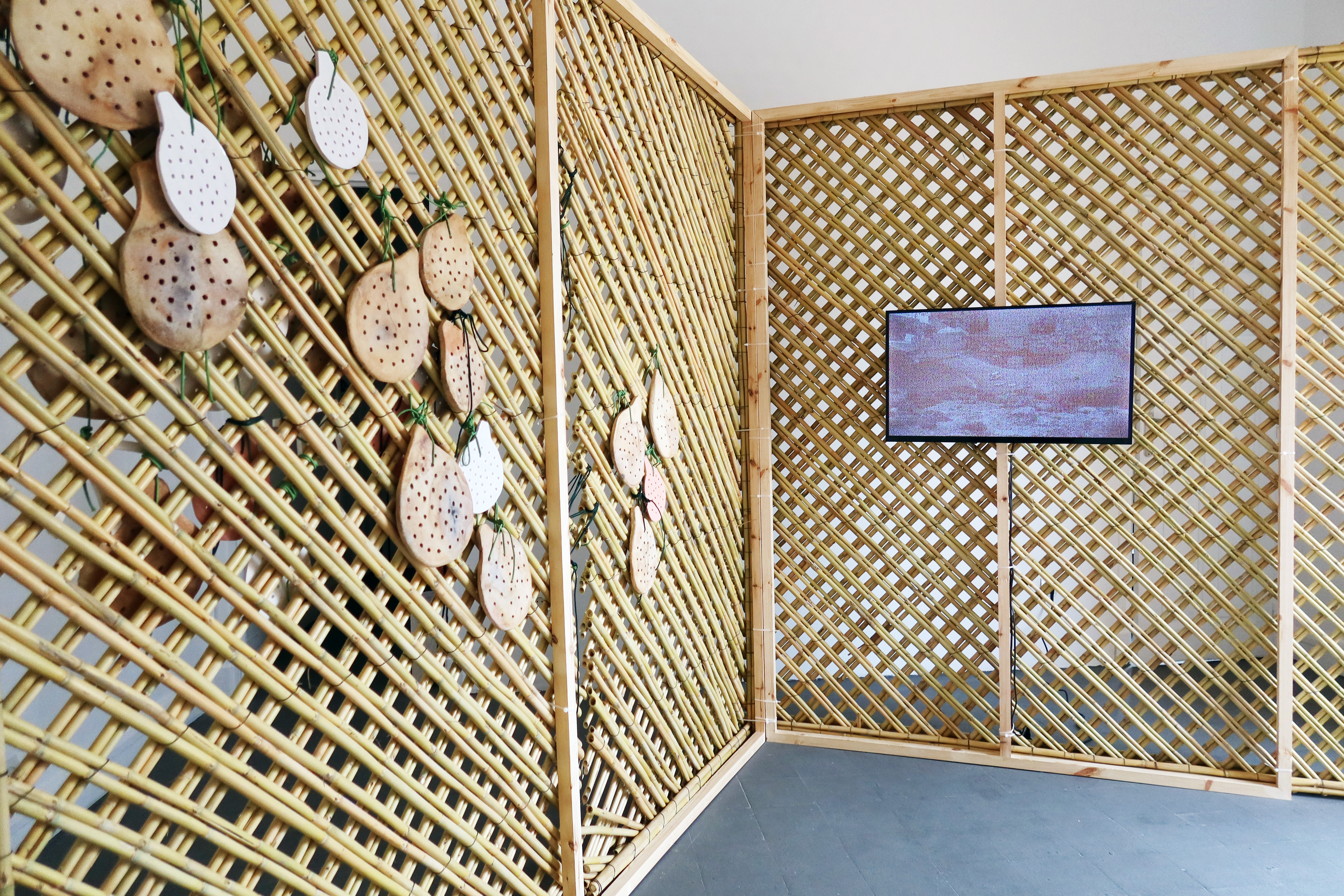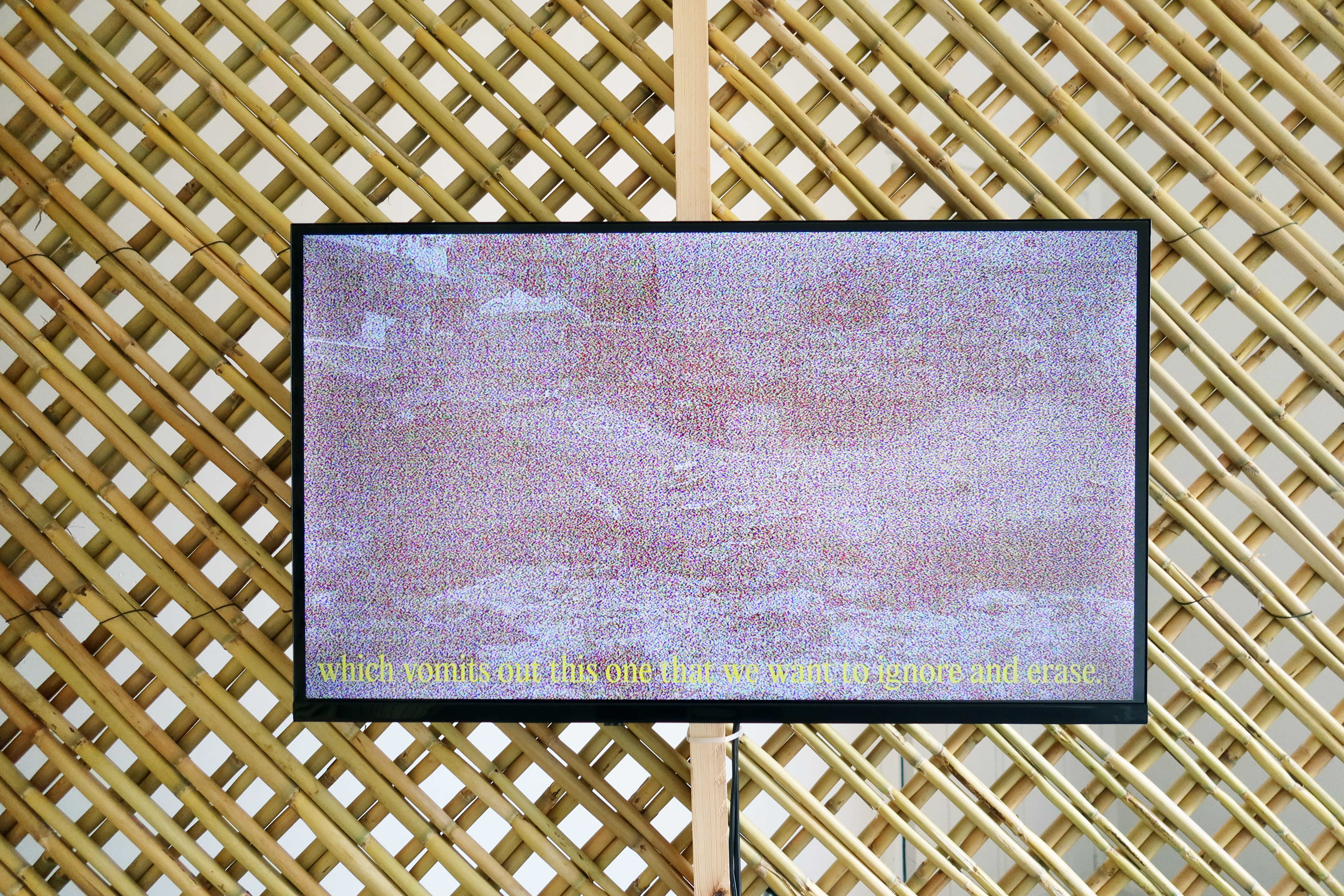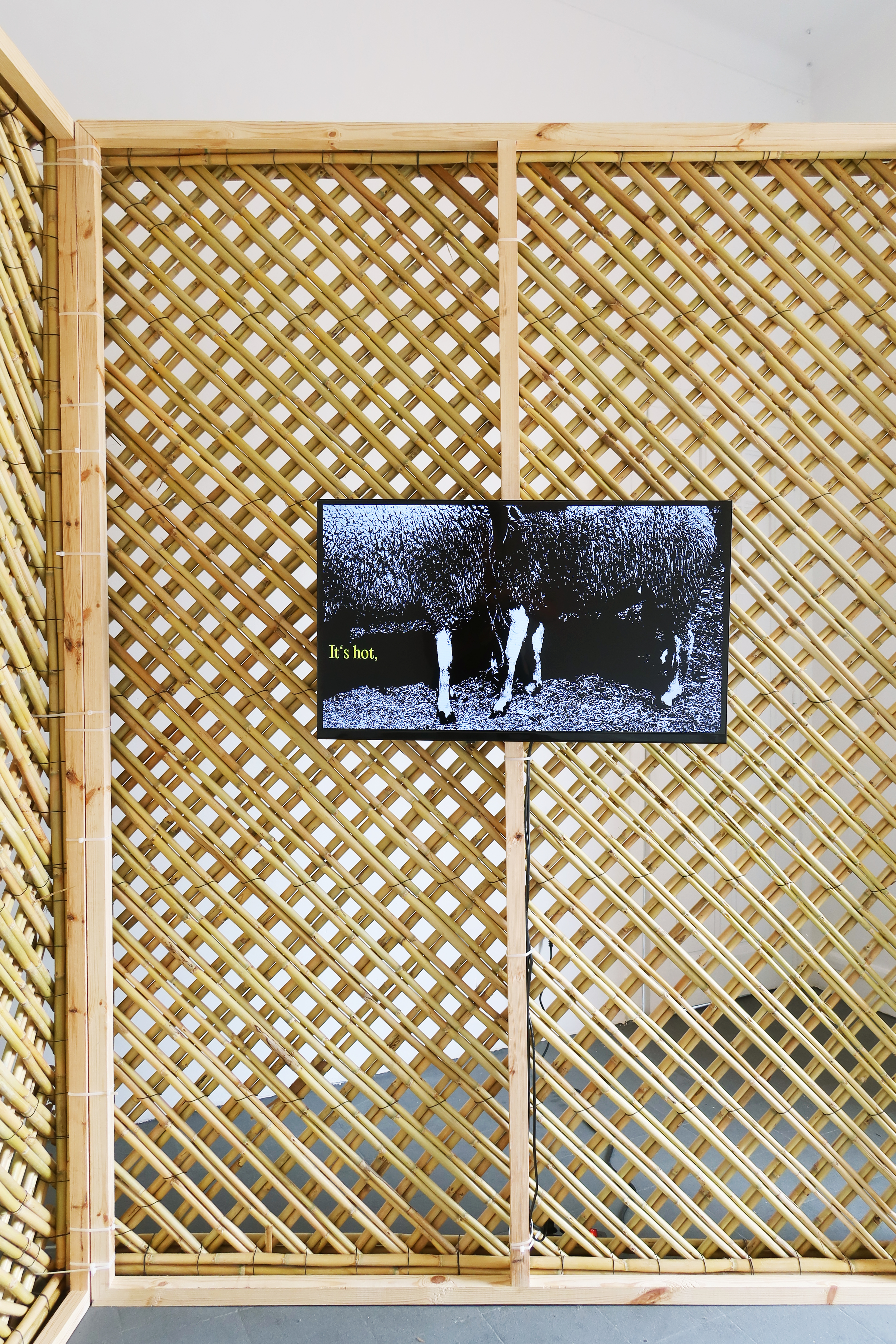Following her artist residency and two trips to the Eastern
Rif in 2024, Dominique Hurth has developed a new installation accompanied by a
publication conceived
for L'appartement 22 in Rabat.
Taking as her starting point the landscapes and soils that function as archives of the region's history, the artist explored during her travels the memory of the Rif War (1921-1927), the traces of latent violence in the landscapes and the notions of emancipation in the colonial past. Through a reading of landscapes, but also through narratives, the superimposition of language on images and the impossibility of visualising certain events, she revisits this violent war that marked a decisive stage in the history of resistance and anti-colonialism. The installation in the exhibition space echoes the artist's own experience of travelling through the countryside, meeting people who are still alive in the Rif, and those who have fled to Europe or Morocco's major cities. This relationship between place of experience and exhibition space is continually integrated into the artist's production process.
The exhibition is built around two central elements, one chosen as a deconstructed and reconstructed ready-made, the other produced by the artist in collaboration with a group of Rifian women. The first element is made up of several walls of bamboo huts found on the Mediterranean coast between Al Hoceima and Nador, and operates in the installation as a support object (or infrastructure). The other objects made by the artist combine materials and shapes gleaned from her observations in the Rif: elements in ceramic, clay and terracotta, the shapes echo various everyday objects from the region or elements of the landscape: at once leaf, scale, bread, spoon, cactus, fruit, tools, they are several things at once, sculptures or objects in abeyance, waiting to be used. In the case of the terracotta sculptures, they directly evoke the history and strata of the mountains through the very material in which they were made: the clay was harvested directly from the mountains, worked by hand, shaped and then fired by hand using the skills of craftswomen from the women's cooperative of the Maison de l'Artisanat de Rouadi in the Rif. The colours and gradations are a direct reference to the mountains from which they flow: eroded, oxidised and exhausted.
This ‘material’ sculpture houses a 20-minute video essay (in French, English and Arabic) by the artist. In a montage of images supported by two voice-overs, the artist poses questions on these landscapes and imposes them on the various researches she has carried out (in archives, in literary traces or collected on the sites) in an attempt to capture the histories of the region, an attempt to materialise or visualise them, often without succeeding, inaccessible.
This installation, which embodies both the ecological and historical dimensions of Dominique Hurth's work, is the artist's first chapter on the history and repercussions of the war in the Rif. The walls of the hut also echo the bamboo twins that will be installed in the long term in the heights of the Rif for the Rif Résidences project - a sculpture, shelter and artist's studio in one. Both the publication and the sculpture follow a process of linguistic, material and visual research - asking questions and imposing them on others.
Taking as her starting point the landscapes and soils that function as archives of the region's history, the artist explored during her travels the memory of the Rif War (1921-1927), the traces of latent violence in the landscapes and the notions of emancipation in the colonial past. Through a reading of landscapes, but also through narratives, the superimposition of language on images and the impossibility of visualising certain events, she revisits this violent war that marked a decisive stage in the history of resistance and anti-colonialism. The installation in the exhibition space echoes the artist's own experience of travelling through the countryside, meeting people who are still alive in the Rif, and those who have fled to Europe or Morocco's major cities. This relationship between place of experience and exhibition space is continually integrated into the artist's production process.
The exhibition is built around two central elements, one chosen as a deconstructed and reconstructed ready-made, the other produced by the artist in collaboration with a group of Rifian women. The first element is made up of several walls of bamboo huts found on the Mediterranean coast between Al Hoceima and Nador, and operates in the installation as a support object (or infrastructure). The other objects made by the artist combine materials and shapes gleaned from her observations in the Rif: elements in ceramic, clay and terracotta, the shapes echo various everyday objects from the region or elements of the landscape: at once leaf, scale, bread, spoon, cactus, fruit, tools, they are several things at once, sculptures or objects in abeyance, waiting to be used. In the case of the terracotta sculptures, they directly evoke the history and strata of the mountains through the very material in which they were made: the clay was harvested directly from the mountains, worked by hand, shaped and then fired by hand using the skills of craftswomen from the women's cooperative of the Maison de l'Artisanat de Rouadi in the Rif. The colours and gradations are a direct reference to the mountains from which they flow: eroded, oxidised and exhausted.
This ‘material’ sculpture houses a 20-minute video essay (in French, English and Arabic) by the artist. In a montage of images supported by two voice-overs, the artist poses questions on these landscapes and imposes them on the various researches she has carried out (in archives, in literary traces or collected on the sites) in an attempt to capture the histories of the region, an attempt to materialise or visualise them, often without succeeding, inaccessible.
This installation, which embodies both the ecological and historical dimensions of Dominique Hurth's work, is the artist's first chapter on the history and repercussions of the war in the Rif. The walls of the hut also echo the bamboo twins that will be installed in the long term in the heights of the Rif for the Rif Résidences project - a sculpture, shelter and artist's studio in one. Both the publication and the sculpture follow a process of linguistic, material and visual research - asking questions and imposing them on others.
dans des caves inacessibles
(in unseen caves)
2024
Installation with hand-crafted bamboo walls, ceramic and clay objects, terracota sculptures, video (French, English, Arabic, 19:43 min)
The exhibition, research and travel have been supported by the Institut Français de Rabat, the Fondation Almayuda, the Institut für Auslandsbeziehungen (IFA), and the Gwaertler Stiftung.
Terracota sculptures produced in collaboration with Farida Elazzouzi and Khaddouj Ichouikhen of the Rouadi Women's Cooperative, Maison de l'artisanat de Rouadi, August 2024.
Arabic translation (essay-film): Omar Nicolas.
Publication of 64 pages (DIN A5) and 2 inserts (DIN A6) printed on offset in 250 copies (French and English)
Thanks to : Sanaa Zaghoud (curatorial coordination and research), Soukaina Joual (member of the Artistic Direction and cooperative of L'appartement 22), Farida Elazzouzi of the Maison de l'Artisanat de Rouadi and the women of the cooperative, Omar Nicolas. Intern: Paul Kerma
Installation shots:
Solo Exhibition at L’Appartement 22, Rabat (MA)
07.09-05.10.2024
(in unseen caves)
2024
Installation with hand-crafted bamboo walls, ceramic and clay objects, terracota sculptures, video (French, English, Arabic, 19:43 min)
The exhibition, research and travel have been supported by the Institut Français de Rabat, the Fondation Almayuda, the Institut für Auslandsbeziehungen (IFA), and the Gwaertler Stiftung.
Terracota sculptures produced in collaboration with Farida Elazzouzi and Khaddouj Ichouikhen of the Rouadi Women's Cooperative, Maison de l'artisanat de Rouadi, August 2024.
Arabic translation (essay-film): Omar Nicolas.
Publication of 64 pages (DIN A5) and 2 inserts (DIN A6) printed on offset in 250 copies (French and English)
Thanks to : Sanaa Zaghoud (curatorial coordination and research), Soukaina Joual (member of the Artistic Direction and cooperative of L'appartement 22), Farida Elazzouzi of the Maison de l'Artisanat de Rouadi and the women of the cooperative, Omar Nicolas. Intern: Paul Kerma
Installation shots:
Solo Exhibition at L’Appartement 22, Rabat (MA)
07.09-05.10.2024










